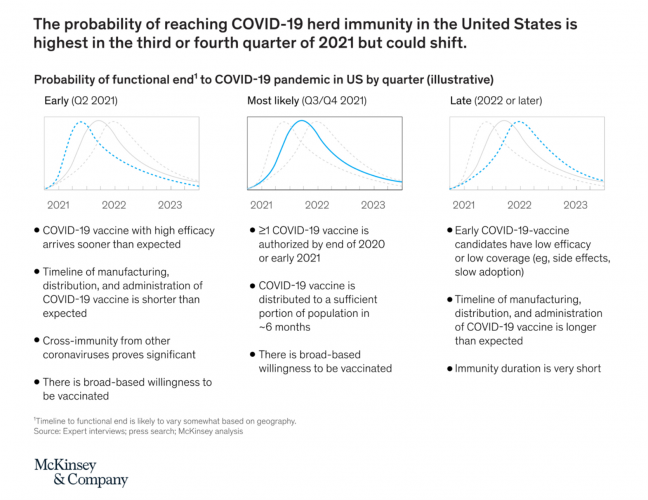When Will This Pandemic End And What Should We Focus On?
Randy Wolken, President & CEO
In my role as President & CEO of MACNY and as a member of the Central New York Control Board, I am often asked when I think we will return to more “normal” times. This is a difficult question to answer. It’s even more challenging to predict what will occur. However, looking at several scenarios can help put into perspective what may come next. McKinsey & Company has taken a reasoned approach to how the pandemic might end and when. It can be helpful to review the scenarios so we can plan for the future. It is also useful in encouraging us to continue efforts to remain safe while continuing our economic recovery.

As you can see in the above analysis by McKinsey & Company, we are likely to be feeling the impacts of COVID-19 for quite some time. All the scenarios place our recovery in the context of the deployment of a safe and effective vaccine. However, it would likely rely on continued health measures such as appropriate mask-wearing, social distancing, and ongoing disinfecting. These key measures increase the chance of keeping the remaining COVID-19 infections in-check as we reach higher states of immunity in our community. We may also need to have annual vaccinations as we do with the flu if COVID-19 mutates. All of these considerations are likely required to plan for our future.
It’s critical for leaders and team members to prepare for a future with this pandemic’s impacts. Individual and community effects will likely last well after COVID-19 has a vaccine, and we begin to move towards a new normal. So many things about our lives will remain changed. Our economy will be more virtual, we are likely to want our products made closer to us, and we will be using more technology than ever. We can also hope to transition many more jobs to higher-skilled and higher-paying sectors of our economy, such as manufacturing and technology. These changes will likely drive our focus and our investment well into the future.
I encourage all leaders and individuals to start to prepare for a different future than before the pandemic. There is no going back. This fact will challenge us and offer new opportunities. To be successful, we must embrace what we now have, what will likely occur, and what can be accomplished. The sooner we do so, the more quickly we will thrive. It has become my focus, and I am hopeful it will also be yours. Together we can overcome these challenges and build a better community in the future.